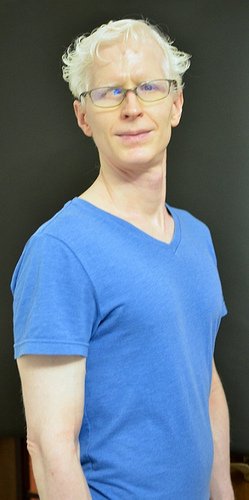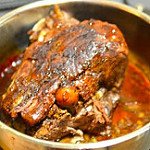
What convinced me to try it?
Sometime in 2011 I heard an interview (on the Tom Woods Show ) with Mark Sisson, author of The Primal Blueprint. The most intriguing thing to me was the reasoning behind the lifestyle that he was promoting. He argued that in order to optimize health, fitness and productivity, we humans need a lifestyle --not just diet, but also activity, sleep, etc—consistent with how our pre-historic ancestors lived over the millennia while our species was evolving. Given that most of our species’ evolution happened before agriculture, this meant avoiding things like grains and large, sweet fruits, which our long-ago ancestors did not have, or had only as a small part of their diet. It also means minimizing sugars, which did not become cheap and widely available until after the industrial revolution, long after agriculture.
From my day job researching plankton, I already knew very well that in order to understand the growth and behavioral response of organisms, my colleagues and I find it very helpful to consider what physiological responses and strategies would be expected to evolve in the natural environment. (On the off chance that anyone actually wants to know more about that, here’s a paper I published: Smith et al. (Limnology and Oceanography 2011) ). So, even though I was not (and still am not) so convinced of the supposed benefits of eating “organic” foods, nor was I sure about the benefits he claimed in terms of health, I appreciated the reasoning behind his Primal Blueprint enough that I thought I’d give it a try. I bought the book in December, 2011 and read it over the Christmas holidays.
Giving it a try.
The 21 day challenge, as Mark called it, seemed only moderately challenging to me. I did love good bread, though! However, I already ate very little sugar and (I thought) plenty of meats and fish. Anyhow, it was a little exciting to do an experiment on myself.
So, I followed the recommendations, most important:
* avoided grains, sugars, and even starchy vegetables like potatoes,
* got the recommended exercise, which I had mostly been doing anyway
I did find, as Mark wrote in the book, that I sometimes felt just a little light-headed while exercising during those first three weeks. The idea is that a body adapted (technically, the word is acclimated) to getting most of its energy from carbohydrates should require about 3 weeks to get used to relying mainly on fat for energy. Getting used to in this case means up-regulating the genes for turning fat into blood sugar, which provides most of our energy. During that time, after carbohydrate intake has been decreased and before the genes that encode for fat-burning have been up-regulated, blood sugar levels may get a little low.
However, after about 3 weeks I found that I no longer felt low on energy. In fact, I had much more even energy levels than when I had been eating lots of carbs. I discovered that I really didn’t mind skipping a meal, or even two. Most of the time I would eat at mealtime simply out of habit.
How did it benefit me?
I’ve stuck with this way of eating and living for over four and a half years now because it really did improve my quality of life. I feel healthier and more energetic now at age 45 than I did 5 years ago, and I think I look at least as healthy (the photo above was taken this evening). I was generally healthy before, but I did get quite low on energy at times, particularly after lunch, even though I spent a lot more time at the gym before I went Primal.
The main benefits I find are:
* Not getting hungry a few hours after every meal
* Not getting sleepy (blood-sugar crash) after meals, especially after lunch
* More even energy levels
* Better ability to concentrate, and greater productivity at work
* Staying lean and fit while spending much less time exercising
The main ‘cons’ that I find are:
* Fewer choices in terms of restaurants and dishes that I want to eat
* The expense of buying more meat, fish, and healthy oils
* Sometimes having to refuse (other times not) sweets, etc, when offered
For me the pros far outweigh the cons. I don’t really miss the bread so much, and once in a while I try a little, usually with a heavy coating of butter or cheese! I feel quite satisfied and healthy eating lots of meats, fish, vegetables and fruits (usually the not-so-sweet ones). I think I may actually save money this way. I don’t spend so much at fancy bakeries any more, and I don’t get sick as often.
I get to enjoy eating things like this lovely leg of lamb that I roasted a few weeks ago!

My most interesting related discoveries:
I learned about the importance of the quality of fats and oils, and the benefits of:
* Coconut oil
* Olive oil
* Natural butter, from grass-fed cows if possible
* Omega-3 fatty acids (found in fish oils, for example)
Quality is much more important than quantity,
with food as with much else in life. I highly recommend Gary Taubes excellent book Good Calories, Bad Calories.
Cholesterol is good for us!
I know the government run-schools, USDA, FDA and so many people tell us otherwise. But if you don’t believe it, please look into it. One good book with clear explanations and interesting anecdotes is “Ignore the awkward! How the cholesterol myths are kept alive” by Uffe Ravnskov. Another that I read (as an audiobook) recently is "Grain Brain", by David Perlmutter (M.D.).
Banting
Only recently did I learn that very similar ideas had been around, and had proven quite effective, even in the 19th century. It started with a fellow named William Banting, who was an undertaker. I learned this from a set of YouTube videos where Lorenzo Delano interviews Professor Tim Noakes.
Some resentment
Not at all for Mark Sisson, nor any of the folks promoting banting or Paleo living, but for the system of government agencies and government-run education that gave me so much unhealthy advice! Eat less fat, they said. Cholesterol is bad, they said. Eat lots of grains, they said. They’re still subsidising grain production, and giving special advantages to the producers of high fructose corn syrup, among other harmful ‘foods’.
I wonder how much healthier, taller, stronger, more confident, and more successful I could have been if I had grown up without that kind of advice and ‘education’ about how to eat!
Still, life is good.
Now more and more people are learning how to eat better and live better, largely thanks to the internet allowing cheap, easy and fast communication. I very much like that Steemit is a decentralised forum, which encourages sharing this kind of information.
Finally, a few related links that I like:
http://www.marksdailyapple.com
http://fatburningman.com
http://lorenzodelano.com/banting-with-tim-noakes/
